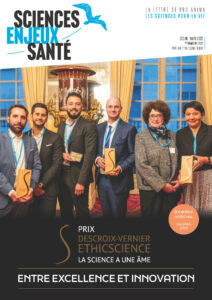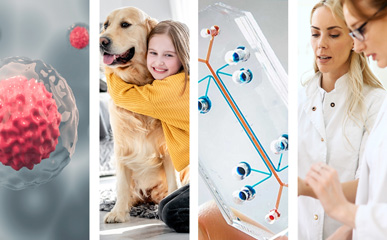
Workshop for the European Commission roadmap, HEARTS Act, new Netherlands Academy of Engineering Fellow and others
News on non-animal methods
Nov. 13 - 17, 2023A roadmap for phasing out animal testing in chemical safety assessments : 2023, Dec. 11 — 12
This workshop has been organised as part of the Commission’s response to the European Citizens’ Initiative (ECI) ‘Save Cruelty-free Cosmetics — Commit to a Europe without Animal Testing’.
The “Workshop on a roadmap towards phasing out animal testing for chemical safety assessments” is an opportunity for all stakeholders interested in the process to get involved.
Speakers from the Commission, the EU regulatory agencies EFSA, ECHA and EMA, NGOs, industry associations and research institutes will provide ideas and discuss possible approaches for the uptake of non-animal methods in chemical legislation. Accelerating validation and acceptance of non-animal methods is a key element to achieve this goal. Case studies addressing several areas of concern will help to identify the necessary steps to develop this roadmap.
HEARTS Act inspired advisory council and working group aims to advance in biomedical research
The U.S National Institutes of Health (NIH) has created a working group to develop non-animal testing methods. HEARTS (Humane and Existing Alternatives in Research Sciences) Act is included in the 2023 bill of NIH to assemble a Humane Research Alternatives Panel. They invest in the development of NAMs more and more.
“The working group should review and recommend means of encouraging greater reliance on validated human-relevant non-animal methods/approaches that are appropriate for identified research areas. Membership should include individuals with proven knowledge of/experience with non-animal research methods ; with proven knowledge of/expertise with animal research models ; with expertise in evaluating the adequacy of justifications described in research applications and proposals for why the research goals cannot be accomplished using an alternative model ; and with knowledge of research animal welfare, and relevant scientific limitations. The Committee asks that NIH provide a report of the working group’s findings within 180 days of enactment of this Act.”
MIMETAS Co-CEO, Paul Vulto, nominated as new Netherlands Academy of Engineering Fellow
The Hague, November 2, 2023 – Netherlands Academy of Engineering nominates MIMETAS CEO, Paul Vulto as a new Fellow, alongside 61 others, to actively contribute to their mission. This nomination emphasizes the crucial role of innovative technological solutions in addressing pressing societal challenges and sustainable change.
Dr. Paul Vulto, CEO of MIMETAS, a leading company in the field of organ-on-a-chip technology, is among the distinguished professionals nominated as NAE fellows. Dr. Vulto is recognized for his international pioneering activities in the Organ-on-a-Chip space and his breakthrough microfluidic discoveries such as PhaseGuide™ technology and the OrganoPlate® platform.
Towards skin-on-a-chip for screening the dermal absorption of cosmetics
While several new approach methodologies (NAMs) have been approved for assessing different toxicological endpoints in the UK and across the EU, there remains an absence of animal-free screening methods for dermal absorption ; a measure that assesses the degree to which chemical substances can become systemically available through contact with human skin.
In a recent article published in Lab-on-chip journal, researchers identified some of the major technical barriers that have impacted regulatory recognition of an in vitro skin model for this purpose and propose how these could be overcome on-chip using a digital biomanufacturing pipeline that connects the design, microfluidic generation and 3D printing of artificial cells into user-crafted synthetic tissues.
They highlight milestone achievements towards this goal, identify future challenges, and suggest how the ability to engineer animal-free skin models could have significant long-term consequences for dermal absorption screening, as well as for other applications.
Latest EUON study identifies models and tools for computational safety assessment of nanomaterials
The European Union Observatory for Nanomaterials (EUON) has published a study that analyses read-across and in silico approaches as alternative methods to conventional hazard and risk assessments for nanomaterials. It also includes expert opinions and relevant case studies.
The study identifies 190 alternative models and methodologies for hazard and risk assessment of nanomaterials. To complement these findings, several experts in the field of nanoinformatics were interviewed, and three case studies were carried out to determine whether different tools and models are applicable to nanomaterial risk assessment.
The report offers an interesting read for anyone looking for a comprehensive overview of the current state of the existing (read-across) models and tools for the in silico risk assessment of nanomaterials.
As nanomaterials can be found in more and more consumer products, such as solar cells, paints, food additives and cosmetics, their potential hazards and risks must be carefully assessed. The use of computational methods in the risk assessment process can be an alternative to speed up the assessments, avoiding animal testing and reducing costs, provided they are relevant and reliable.
Intestinal Organoids Illuminate Cronkhite-Canada Syndrome’s Origins
According to insiders, researchers at Baylor College of Medicine and collaborating institutions have made significant progress in understanding the causes of Cronkhite-Canada syndrome, a rare condition characterized by noncancerous growths or polyps in the intestine.
Cronkhite-Canada syndrome is a little-known disease that affects approximately 500 people worldwide. Due to its rarity, there has been limited research on this disease and its potential therapies.
To delve deeper into the mechanisms behind the excessive proliferation observed in patients’ intestines, researchers utilized human intestinal organoids or “miniguts.” These organoids are laboratory-grown models of human intestinal cells that accurately represent real small intestine tissue and its functions.
The team obtained biopsy samples from a patient with Cronkhite-Canada syndrome and cultivated miniguts in the lab.
Start-up Frontier Bio’s Lab-Grown Blood Vessel Tech by 3D Printing
Biotech startup Frontier Bio has introduced a method to produce living human blood vessels in the lab. This innovation can potentially reshape the landscape of animal testing for vascular medical devices. With the Mayo Clinic, Frontier Bio successfully tested a device in a lab-made blood vessel that can redirect blood flow. Using 3D printing, the company can replicate complex vascular structures, mimicking natural and disease-related conditions.
Until now, animal studies have been a critical yet controversial step in evaluating the safety and performance of vascular medical devices.
Frontier Bio’s new technique uses tissue engineering to grow these blood vessels in the lab. They do this by placing special cells onto a material that eventually breaks down on its own. Using conditions similar to how our body works and employing 3D printing technology, they can make these blood vessels in various shapes, including those that look like natural blood vessels or even ones with certain diseases.
18 Organizations, 246 Scientists and Scholars Send Letter to New Director of NIH, Urging Shift Away From Animal Use in Medical Research
A group of scientists, physicians, ethicists, and advocates sent a letter this Wednesday to the newly confirmed director of the NIH, Dr. Monica Bertagnolli, urging her to reduce the agency’s use of animals in medical research.
Led by the Physicians Committee for Responsible Medicine and co-signed by 246 individuals and 18 organizations, including biotechnology companies, think tanks, and animal protection groups, the letter requests that Dr. Bertagnolli prioritizes funding for developing, validating, and using non animal human disease models. It also requests divestment from animal use in research areas where poorly predicted human outcomes have been demonstrated, such as vaccine development and liver toxicity.
Despite evidence that animal experiments are unreliable predictors of human physiology and disease states, they remain the presumed “gold standard” in basic and preclinical research by the NIH and others within the research community. This reliance on animals contributes to failures and wasteful spending in the drug development pipeline and puts clinical trial participants at risk by failing to capture unsafe or ineffective products.


